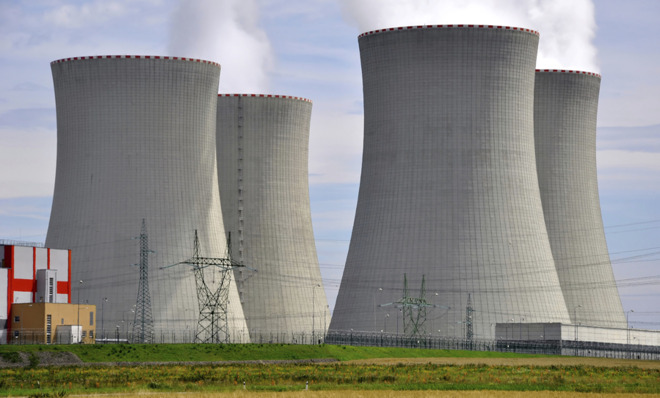This energy source could solve all of our problems — so why is no one talking about it?
Hint: It's because it can't be weaponized


A free daily email with the biggest news stories of the day – and the best features from TheWeek.com
You are now subscribed
Your newsletter sign-up was successful
Energy is arguably the single most important strategic issue of our time. It literally powers everything we do. The world economy see-saws to the gyrations of oil prices. Most of our geopolitical squabbles are about energy in one way or another. And, of course, above all hovers the threatening Armageddon of global climate change.
But when it comes to energy, you probably don't know who, or what, to trust. Clean energy! No, wait, that doesn't work! (And what does that mean, exactly?) Shale gas! No, wait, you will pollute everything.
There's a band of hipsters within the community of people who think hard about energy who think this is a bunch of hoo-ha. We already have a perfectly useful and clean energy source, they say: nuclear power. In terms of its capacity, nuclear power could provide almost all of our energy needs. In terms of carbon emissions, nuclear power is totally clean. Outside of a handful of countries whose names you probably already know, proliferation isn't an issue. Of course, there's the issue of safety. But nuclear power is safe, advocates say. Chernobyl happened because of the insanity of communism, and Fukushima because you probably shouldn't build reactors on the path of tsunamis, not because of anything inherent to nuclear power. The solution to nuclear waste, they say, is more R&D, so that waste can be recycled. Look at France! It draws almost all of its energy from nuclear power, with no serious incident to note in the past 50 years, and the power is cheap, plentiful, and clean.
The Week
Escape your echo chamber. Get the facts behind the news, plus analysis from multiple perspectives.

Sign up for The Week's Free Newsletters
From our morning news briefing to a weekly Good News Newsletter, get the best of The Week delivered directly to your inbox.
From our morning news briefing to a weekly Good News Newsletter, get the best of The Week delivered directly to your inbox.
Within the energy analysis community, nuclear advocates are one hipster subset. But as always when we're talking about hipsters, there's a subset within the subset. And these energy hipsters are pushing a nuclear technology that has all the advantages of traditional nuclear and none of the drawbacks. Its name is thorium.
Thorium is an element, like uranium and plutonium, which you can use as fuel for a nuclear reactor. Unlike uranium and plutonium, thorium is abundant. Unlike uranium and plutonium, thorium reactors could have "passive" safety. Traditional nuclear reactors sometimes have the annoying tendency of sometimes exploding and showering the area around them with radioactive waste. This is because plutonium and uranium reactors, when shut down, cannot cool off on their own. They need "active" systems to cool them down. If these systems fail, the reactor starts going into meltdown. Thorium, being a lighter element, doesn't have that problem. If you have an emergency in a thorium reactor, you shut it off, and it cools down on its own. It can't melt down. Unlike uranium and plutonium, thorium produces minimal amounts of waste, and even the little waste it does produce is potentially recyclable. And finally, unlike uranium and plutonium, with thorium you can make a reactor, but you can't make a bomb.
And there you have the problem.
Thorium advocates point out that almost from the beginning, nuclear research has been sponsored by governments — or, more accurately, military-industrial complexes. The nuclear age started in World War II and the Cold War, when researching nuclear technology meant researching military technology. Peaceful nuclear technology was a happy dividend, but it was never the focus. The list of countries with nuclear power industries is also the list of nuclear warhead superpowers (even South Africa's peaceful nuclear industry is an offshoot of its Apartheid-era nuclear weapons program). And so those who hold the purse strings of nuclear research relegated thorium to the dustbin of history. Not because of any global conspiracy, mind you, but just because they acted rationally given their priorities at the time. And then inertia takes over. Anybody who's anybody in the nuke-industrial sector has spent their entire career working on uranium and plutonium, which is a bird in the hand, and so they dismiss thorium as a pipe dream.
A free daily email with the biggest news stories of the day – and the best features from TheWeek.com
Is it? I'm no scientist, but what I've read suggests thorium energy is very much conceivable. And if it works, it really would be the technology that solves all our energy problems.
Am I saying it will do that? No. Am I saying we should be talking a heck of a lot longer — and louder — about it? Absolutely yes.
Pascal-Emmanuel Gobry is a writer and fellow at the Ethics and Public Policy Center. His writing has appeared at Forbes, The Atlantic, First Things, Commentary Magazine, The Daily Beast, The Federalist, Quartz, and other places. He lives in Paris with his beloved wife and daughter.
-
 How to Get to Heaven from Belfast: a ‘highly entertaining ride’
How to Get to Heaven from Belfast: a ‘highly entertaining ride’The Week Recommends Mystery-comedy from the creator of Derry Girls should be ‘your new binge-watch’
-
 The 8 best TV shows of the 1960s
The 8 best TV shows of the 1960sThe standout shows of this decade take viewers from outer space to the Wild West
-
 Microdramas are booming
Microdramas are boomingUnder the radar Scroll to watch a whole movie
